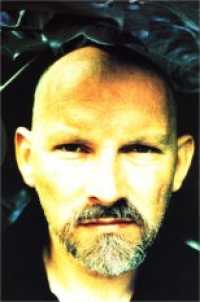After 16 years of searching the world for meaning and knowledge through music as one half of Dead Can Dance, Brendan Perry now embarks on a similar journey with his solo debut, 'Eye of the Hunter'.
Begun a few years ago in between Dead Can Dance and various other recording projects, 'Eye of the Hunter' will sound immediately familiar to the many fans of the duo eager to hear more since their dissolution last year. The lush production sensibilities and boundary-defying spirit of Dead Can Dance are intact, and many of the songs on 'Eye of the Hunter' are tinted with flavours of disparate musical styles. But there is also a difference in the manner the music was made and also how it presents itself. Though Dead Can Dance employed vocals they generally didn't speak in a spoken language. The music was their language, and their goal was to make manifest the unspeakable. In recording, the duo often let the music they were making lead them to a destination.
In contrast, 'Eye of the Hunter's vignettes were written from a guitar/singer process. Instead of being the centrepiece, the music, centred usually around Brendan's thoughtful and restrained guitar plucking or strumming, acts more as a backdrop for his deep, gentle vocals. And while much of Dead Can Dance's music eluded categorisation, Brendan has made a folk record in the truest sense: It's songs, each one its own story but contributing to the themes of the record, are expressions of his life experiences.
The album was recorded at Brendan's Quivvy Church studio in County Cavan in Ireland. Its setting in relative isolation allows Brendan the freedom to pursue his interests, from musical soul-searching and astronomy to zen archery and arboriculture.
Dead Can Dance's music often suggested a search for meaning and sense in the world, and Brendan has taken up a similar journey. But instead of looking at the external world, he has decided to explore the inner world of his own private universe. "People have multiple personalities which are always evolving," he says. "This record deals with the different facets of my own personality."
Laden with symbolism, 'Eye of the Hunter's deeply personal songs explore the often sad themes of loss, both of life and love, but an air of hopefulness blows through much of the record, as Brendan places them as pieces to the larger puzzle of life and meaning. "Saturday's Child," which opens the record, poignantly describes the changing relationship between Brendan and his father as each grew older. "Sloth" looks back to all the wasted moments in one's life, time lost to anger, addiction and slothfulness, preventing us from achieving our true potential. "The Captive Heart" deals with the attempt to keep love afloat over a long distance. A cover of Tim Buckley's classic "Must Have Been Blind" shines with one of the record's more extravagant arrangements, with layers of Martin Quinn's pedal steel supporting Brendan's strumming and soaring vocals. But 'Eye of the Hunter's centrepiece is the autobiographical "Voyage of Bran," where Brendan describes the roots of his searching.
Over the course of 16 years, eight albums and a myriad of EPs and side projects, Dead Can Dance established themselves as the pre-eminent group of their kind and also as 4AD's biggest international artists. Freely crossing both musical and geographic boundaries, Perry and Gerrard defied all attempts by critics to categorise their music according to current trends. With 'Eye Of The Hunter' Brendan Perry has followed his musical legacy, creating his own album of timeless beauty.
